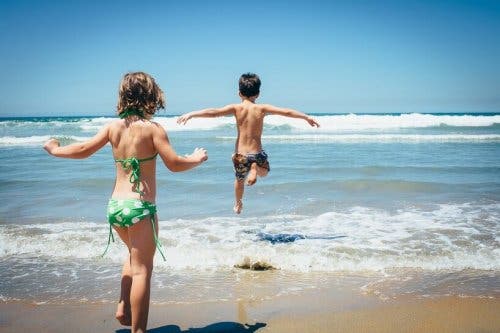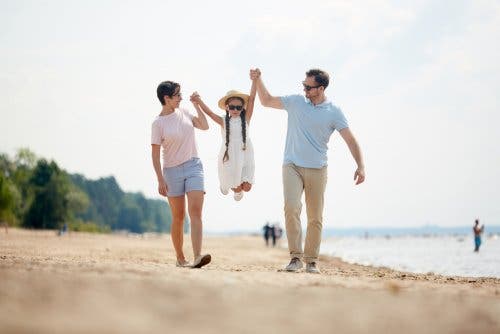Children Are Happier While on Vacation


Written and verified by the teacher Azucena Fernández
During vacation, parents don’t concentrate as much on their work and other responsibilities. Rather, they have time to relax and play, giving their children the precious gift of their time. Today, we’ll look at the reasons why children are happier while on vacation, according to science.
During vacation times, parents tend to spend more time with their children and do fun activities with them. For example, enjoying picnics on the beach, building sandcastles, and splashing in the waves. These aren’t just really fun ways to spend the summer, they’re also forms of “attachment play.” In other words, they’re activities that help parents and children connect and strengthen emotional bonds.
Attachment play increases self-esteem and sends children a psychological message: “You have all my attention. I like you. I like to spend time with you.”
Children are happier while on vacation: The scientific data
Enjoying vacations as a family takes on greater importance if we compare it to what happens at home on a day-to-day basis. Many families have lives that are full of stress. Here, we have a few interesting statistics to help you better comprehend the issue:
- Two-thirds of conversations between parents and children have to do with daily routines (Elizabeth Buie, TES).
- 65% of parents stated that playing with their children only makes up an occasional part of their day-to-day activities. One out of every six parents says that they don’t know how to play with their children. And one-third of parents say they don’t have time to play.
- 25% of children say they talk with their parents about something important more than once a week.

- We worry about our physical health, but we often forget to pay the same amount of attention to the health of the relationships within our family. Research shows that the health of our relationships is a vital part of our physical health (Holt-Lunstad).
Brain development
The claim that children are happier during summer vacation also has to do with the fact that it can promote brain development. During family vacations, two genetically rooted systems become active deep in the limbic area of the brain. And it’s not easy to exercise these same systems – play and seeking – while at home.
The play system of the brain gets a workout every time we do things like bury our children’s feet in the sand… Or every time we tickle them with a towel at the beach… Or every time we take them for a walk in our arms. And we exercise the seeking system every time we do things like explore a place together: The beach, the woods, a new town…
“Fill you life with experiences, not things. Have stories to tell, not stuff to show.”
– Unknown –
Children are happier while on vacation: Neurochemicals in the brain
According to science, family vacations activate neurochemicals that transmit a sense of well-being in the brain. These cerebral systems were discovered by professor Jaak Panksepp, a neuroscientist at Washington State University. Once family vacations activate these systems in your brain and those of your children, they release neurochemicals that promote a sense of wellbeing. To be more specific, these are opiates, oxytocin, and dopamine.
Panskepp calls them “gifts of nature.” They reduce stress and activate warm and generous feelings – a sense that everything’s okay. With all of the anti-stress factors of these systems at work, members of the family enjoy a shared sense of emotional well-being.
“We can choose activities and pursuits that release the oxytocin stored in our own inner medical cabinet…We have this wonderful healing substance inside us and need only to learn the many ways we can draw upon it.”
– Panksepp –

The surprising part is that these systems are like muscles: the more you use them, the more they become part of your personality. Or, as the neuroscientist Bruce Perry states: “Emotional states become personality traits.”
So, when you take your child on vacation, you’re supporting their desire to explore (seeking system) a vital resource for living a good life. And you’re also supporting their capacity to play (play system). In adulthood, this translates into the ability to play with ideas, which is essential, for example, to successful entrepreneurship.
Children are happier while on vacation: Developing concentration habits
Research has revealed improvements in children’s attention and concentration levels after being in nature for only 20 minutes. What’s more, outdoor play environments were found to be as good as, or better than, medication for children with ADHD.
There is also evidence to suggest that walks together in nature calm the body, lowering blood pressure and stress hormone levels and even cholesterol. Therefore, parents and grandparents stand to benefit from family vacations as well.
“The greatest legacy we can leave our children is happy memories.”
– Og Mandino –
During vacation, parents don’t concentrate as much on their work and other responsibilities. Rather, they have time to relax and play, giving their children the precious gift of their time. Today, we’ll look at the reasons why children are happier while on vacation, according to science.
During vacation times, parents tend to spend more time with their children and do fun activities with them. For example, enjoying picnics on the beach, building sandcastles, and splashing in the waves. These aren’t just really fun ways to spend the summer, they’re also forms of “attachment play.” In other words, they’re activities that help parents and children connect and strengthen emotional bonds.
Attachment play increases self-esteem and sends children a psychological message: “You have all my attention. I like you. I like to spend time with you.”
Children are happier while on vacation: The scientific data
Enjoying vacations as a family takes on greater importance if we compare it to what happens at home on a day-to-day basis. Many families have lives that are full of stress. Here, we have a few interesting statistics to help you better comprehend the issue:
- Two-thirds of conversations between parents and children have to do with daily routines (Elizabeth Buie, TES).
- 65% of parents stated that playing with their children only makes up an occasional part of their day-to-day activities. One out of every six parents says that they don’t know how to play with their children. And one-third of parents say they don’t have time to play.
- 25% of children say they talk with their parents about something important more than once a week.

- We worry about our physical health, but we often forget to pay the same amount of attention to the health of the relationships within our family. Research shows that the health of our relationships is a vital part of our physical health (Holt-Lunstad).
Brain development
The claim that children are happier during summer vacation also has to do with the fact that it can promote brain development. During family vacations, two genetically rooted systems become active deep in the limbic area of the brain. And it’s not easy to exercise these same systems – play and seeking – while at home.
The play system of the brain gets a workout every time we do things like bury our children’s feet in the sand… Or every time we tickle them with a towel at the beach… Or every time we take them for a walk in our arms. And we exercise the seeking system every time we do things like explore a place together: The beach, the woods, a new town…
“Fill you life with experiences, not things. Have stories to tell, not stuff to show.”
– Unknown –
Children are happier while on vacation: Neurochemicals in the brain
According to science, family vacations activate neurochemicals that transmit a sense of well-being in the brain. These cerebral systems were discovered by professor Jaak Panksepp, a neuroscientist at Washington State University. Once family vacations activate these systems in your brain and those of your children, they release neurochemicals that promote a sense of wellbeing. To be more specific, these are opiates, oxytocin, and dopamine.
Panskepp calls them “gifts of nature.” They reduce stress and activate warm and generous feelings – a sense that everything’s okay. With all of the anti-stress factors of these systems at work, members of the family enjoy a shared sense of emotional well-being.
“We can choose activities and pursuits that release the oxytocin stored in our own inner medical cabinet…We have this wonderful healing substance inside us and need only to learn the many ways we can draw upon it.”
– Panksepp –

The surprising part is that these systems are like muscles: the more you use them, the more they become part of your personality. Or, as the neuroscientist Bruce Perry states: “Emotional states become personality traits.”
So, when you take your child on vacation, you’re supporting their desire to explore (seeking system) a vital resource for living a good life. And you’re also supporting their capacity to play (play system). In adulthood, this translates into the ability to play with ideas, which is essential, for example, to successful entrepreneurship.
Children are happier while on vacation: Developing concentration habits
Research has revealed improvements in children’s attention and concentration levels after being in nature for only 20 minutes. What’s more, outdoor play environments were found to be as good as, or better than, medication for children with ADHD.
There is also evidence to suggest that walks together in nature calm the body, lowering blood pressure and stress hormone levels and even cholesterol. Therefore, parents and grandparents stand to benefit from family vacations as well.
“The greatest legacy we can leave our children is happy memories.”
– Og Mandino –
All cited sources were thoroughly reviewed by our team to ensure their quality, reliability, currency, and validity. The bibliography of this article was considered reliable and of academic or scientific accuracy.
- Jaak Panksepp. (1998). The quest for long-term health and happiness: To play or not to play, that is the question. Psychological Inquiry.
- Julianne Holt-Lunstad, Timothy B. Smith, J. Bradley Layton. (2010). Social Relationships and Mortality Risk: A Meta-analytic Review. Journal pmed.
This text is provided for informational purposes only and does not replace consultation with a professional. If in doubt, consult your specialist.








